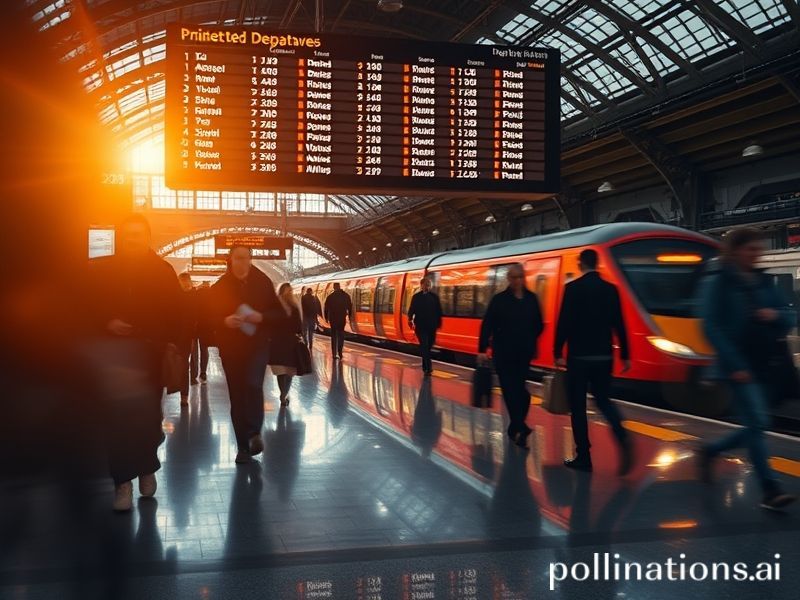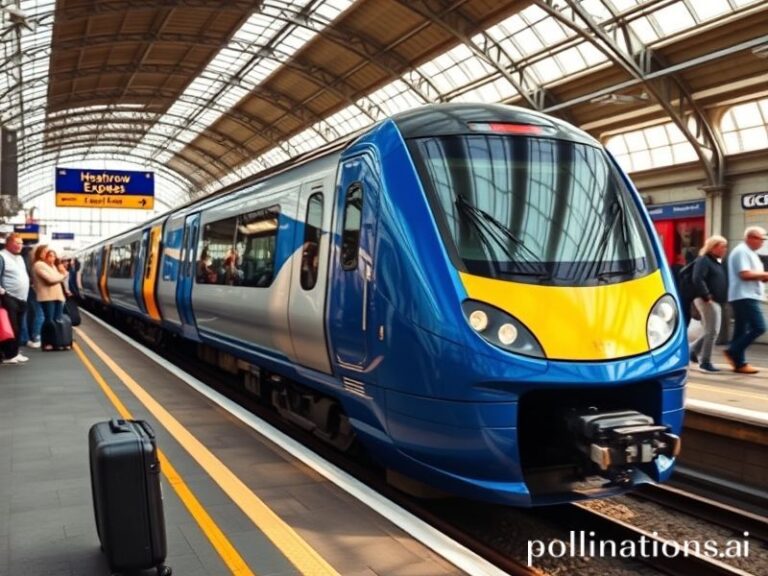Euston Station: The Empire’s Last Waiting Room and the World’s Favorite Cautionary Tale
Euston Station, or How the Empire’s Front Door Learned to Love the Queue
By our London bureau chief, still dazed from the 07:42 to Manchester Piccadilly
On any given Tuesday morning, while Singapore’s Changi offers orchids and a butterfly dome and Dubai International tempts travelers with indoor waterfalls, London’s Euston Station greets humanity with the distinct perfume of wet croissant and existential dread. From the outside the building resembles a brutalist toaster left out in the rain; inside, it functions as Britain’s most honest embassy—an unvarnished waiting room for a country that once ruled the waves and now can’t quite rule its own timetables.
To the foreign eye, Euston is a crash course in post-imperial humility. The same concourse that dispatched steam engines to every corner of the empire now hosts a Costa Coffee queue long enough to be visible from the International Space Station. Here, bankers from Mumbai rub elbows with backpackers from Bogotá, all united in the sacred ritual of discovering their 09:03 to Birmingham has been cancelled “due to a shortage of train crew” (diplomatic speak for “someone overslept”). The message is clear: Britannia no longer waives the rules—she just waves them goodbye.
Global supply-chain aficionados study Euston the way vulcanologists study Kilauea: with protective goggles and morbid fascination. The station’s chronic over-crowding has become a living diagram of what happens when an island nation discovers that infrastructure ages faster than its politicians. HS2—Britain’s £100-billion attempt to catch up with countries that built high-speed rail while the Spice Girls were still in primary school—promises to deliver a new Euston sometime around the heat death of the universe. Until then, passengers bound for Glasgow are advised to bring a tent and a tolerant disposition.
Yet Euston’s misery is strangely exportable. In Lagos, the new Blue Line borrows the same platform screen doors that Euston can’t afford; in Jakarta, planners cite Euston’s passenger-flow chaos as the example not to follow. It is the rare British product still manufactured at scale: a cautionary tale, stamped “Made in the UK” and gift-wrapped with schadenfreude. Even the Americans, connoisseurs of crumbling terminals, look on with the sympathetic nod one reserves for a friend who has finally matched your own dysfunction.
Beneath the grime lurks a darker comedy. The station’s PA system, voiced by a woman who sounds like she’s narrating the end of days, recently informed commuters that platform alterations were “due to a trespasser on the track, possibly armed with a book of poetry.” One suspects the same scriptwriter moonlights at Heathrow. Meanwhile, digital boards flash “See staff for assistance,” an instruction rendered absurd by the ratio of 3,000 passengers to one visibly terrified junior in a hi-vis vest. It’s democracy in action: every man, woman, and wheely suitcase for themselves.
Economists will tell you Euston is a bottleneck costing the UK £50 million a week in lost productivity, but that misses the spiritual dimension. In an age when borders harden and visas shrink, Euston remains a liminal zone where nationality dissolves into the great equalizer of delayed departures. Syrian refugees, Texan tourists, and Essex estate agents all share the same plastic chair, the same flickering Wi-Fi, the same creeping suspicion that the 18:20 to Liverpool has achieved sentience and is actively avoiding them.
As night falls, the last Pret-a-Manger sandwich is sold to a Norwegian DJ who will later discover it contains more mayonnaise than Scandinavia produces in a year. The cleaners arrive, pushing machines that sound like dying lawnmowers, erasing the day’s sins with all the futility of Sisyphus on overtime. Outside, the homeless begin their nightly negotiation with security, a ritual as choreographed as Kabuki and twice as bleak. Somewhere in the rafters, a pigeon coos the national anthem.
And still the trains roll—late, overcrowded, but stubbornly rolling—reminding everyone that even the most threadbare empire can chug along if it simply refuses to admit defeat. The world watches, half-horrified, half-admiring, and books a ticket to King’s Cross instead.







